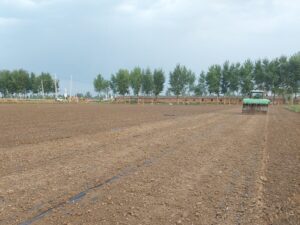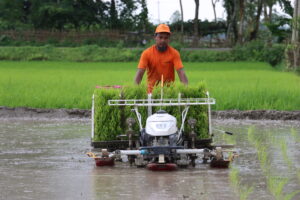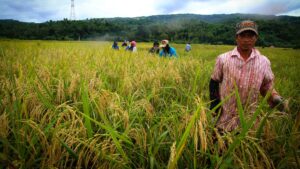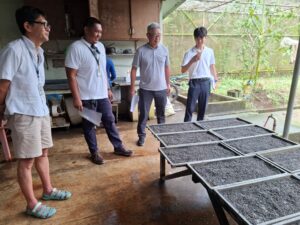Participatory field evaluations with stakeholders reveal farmer-driven varietal preferences and offer strategic guidance for promoting and accelerating climate-resilient rice adoption across the value chain.
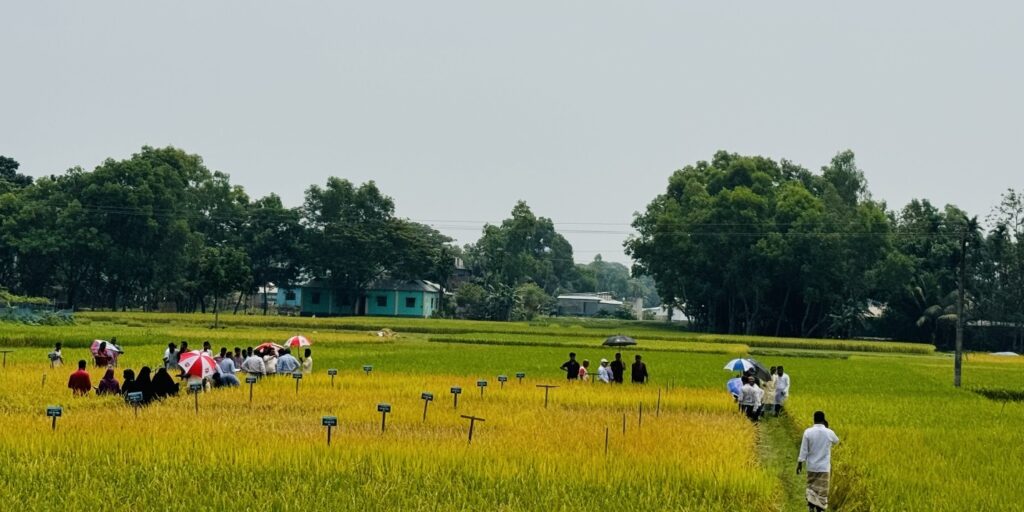
MYMENSINGH, Bangladesh (April 2025) – Over 100 rice value chain actors, including farmers, seed dealers, millers, scientists, and extension officials, convened in Fulbaria, Mymensingh District to participate in a Crop Cafeteria Evaluation Event organized by the International Rice Research Institute (IRRI) Bangladesh in collaboration with the Department of Agricultural Extension (DAE) and the Bangladesh Rice Research Institute (BRRI).
The crop cafeteria method, where different rice varieties are planted in a field for evaluation, allows real-time and comparative assessment of varietal adaptability, yield potential, and stress tolerance in a controlled environment. With a focus on short-duration and high-yielding traits, this event enabled farmers and private sector actors to identify varieties best suited for local conditions.
The event was intended as a decision-shaping platform that enabled stakeholders to directly assess the performance of 14 hybrid rice varieties. This participatory process offered unique value by generating real-time, field-level insights that can inform both varietal selection and promotion strategies.
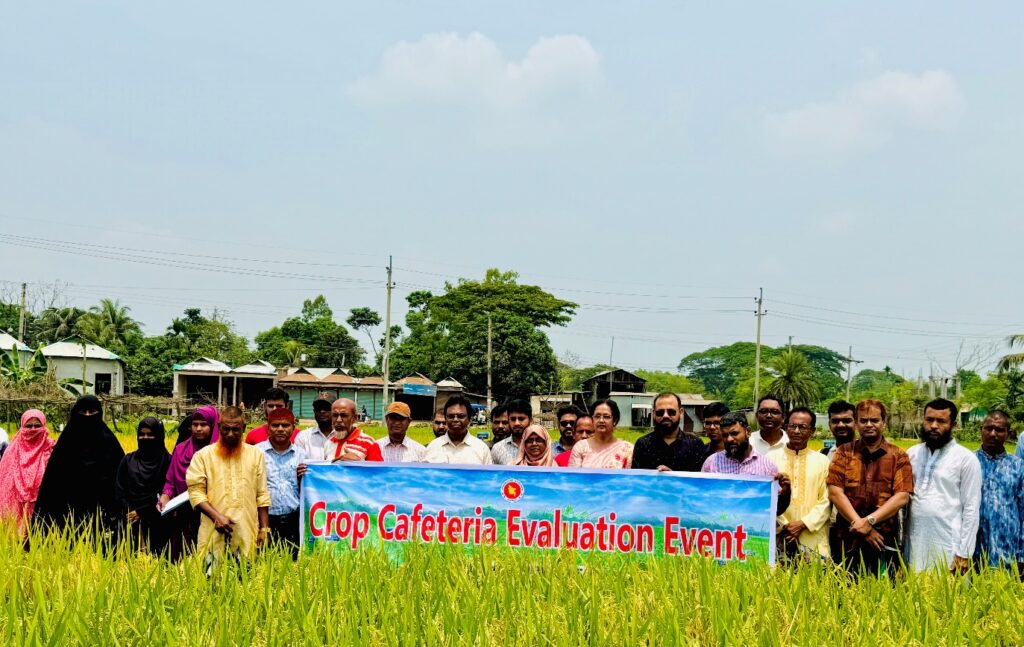
“The crop cafeteria initiative empowers the people most affected by varietal performance—farmers and value chain actors—to guide us on what works best in the field,” said Dr. Md. Sirajul Islam, Chief of Party, IRRI Bangladesh. “It’s a data-driven, participatory model for accelerating resilient varietal adoption in line with national food security goals.”
Conducted during the Boro season, the event applied a blind assessment method using coded plots under the STAR methodology to minimize bias. Stakeholder feedback was gathered through seven focus groups representing male and female farmers, scientists, dealers, millers, DAE staff, and private seed companies. This inclusive format not only captured diverse varietal preferences but also shed light on the gender-differentiated priorities and field realities of different stakeholders.
After visiting the demonstration plots, the evaluation groups shared their feedback during the auditorium session. The interactive format encouraged inclusive participation and highlighted key varietal preferences and areas for further improvement.
Key results and takeaways included the following:
- Farmer-driven insights on varietal adaptability were central to the event. Preferences leaned toward short-duration, high-yielding varieties with improved grain quality and stress resilience.
- Women farmers, often underrepresented in varietal evaluation, shared important feedback that underscored the need for varieties with easier post-harvest handling and better cooking quality.
- Private seed companies gained direct exposure to end-user needs, helping them align breeding and marketing strategies more effectively.
- The collaborative model improved trust and linkages between public research institutions and private sector partners, important for scaling varietal innovations.
Dr. Nasrin Akhter Banu, Deputy Director, DAE Mymensingh and Chief Guest at the event, emphasized the significance of direct farmer engagement. “This program bridges the gap between research, extension, and farmer realities. The feedback from diverse stakeholders—including women farmers—is critical for tailoring varietal promotion to actual field conditions.”
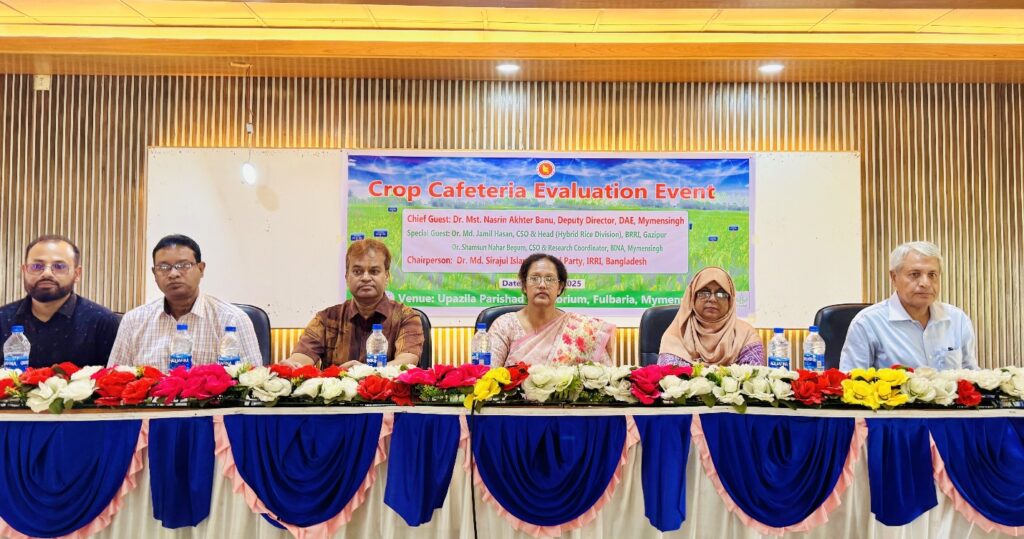
The event was coordinated by Dr. Saidul Islam, Lead Specialist, Seed Systems and Product Management, and Md. Abdur Rahim, Associate Scientist, Seed Sector Development of IRRI Bangladesh. The event was also attended by Dr. Md. Jamil Hasan, CSO and Head of Hybrid Rice Division at BRRI, and Dr. Shamsun Nahar Begum, CSO and Research Coordinator at BINA, as special guests. The opening remarks were delivered by Md. Ashraf Ali, Manager of Project Coordination at IRRI Bangladesh.
Farmer participation was a key part of the crop cafeteria event, delivering on-the-ground perspectives and insights that can guide more responsive varietal development, demand-led seed system planning, and sustainable private sector engagement. Event outcomes will feed directly into varietal scaling strategies in Mymensingh and other target districts under IRRI’s Public-Private Partnership (PPP) Platform.
Supported by Feed the Future and other R&D partners, this effort reflects IRRI’s broader commitment to evidence-based, inclusive innovation in strengthening Bangladesh’s agri-food systems in the face of climate and market challenges.

